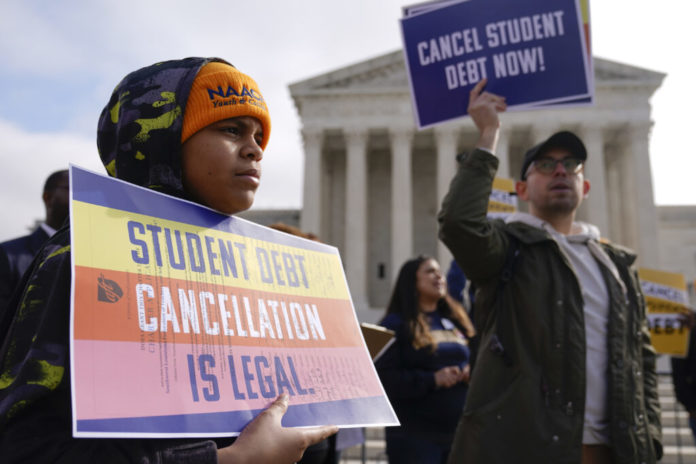 Credit: AP Photo/Patrick Semansky
Credit: AP Photo/Patrick Semansky
Student debt relief advocates gather outside the Supreme Court on Capitol Hill in Washington on Feb. 28, 2023, ahead of arguments over President Joe Biden’s student debt relief plan.
 Credit: AP Photo/Patrick Semansky
Credit: AP Photo/Patrick Semansky
Student debt relief advocates gather outside the Supreme Court on Capitol Hill in Washington on Feb. 28, 2023, ahead of arguments over President Joe Biden’s student debt relief plan.
President Joe Biden’s plan to forgive more than $400 billion in student debt could be in jeopardy after conservative members of the U.S. Supreme Court on Tuesday questioned whether his administration has the authority to cancel parts of undergraduate loans for more than 40 million Americans.
During oral arguments Tuesday in two cases challenging Biden’s plan, members of the court’s conservative majority suggested that the administration had overstepped by not getting authorization from Congress for the loan forgiveness program.
Justice Brett Kavanaugh said he was skeptical about the Biden administration creating a “massive new program” based on its interpretation of a 2003 law and suggested that the court shouldn’t defer to Biden when it comes to “assertions of emergency powers.”
“Some of the finest moments in the court’s history were pushing back against presidential assertions of emergency powers,” he added. He is part of the 6-3 conservative majority on the high court, which has increasingly blocked the use of presidential powers without congressional authorization.
Liberal justices, however, appeared to agree with the Biden administration’s stance that a 2003 law, the Higher Education Relief Opportunities for Students Act, gave the administration the authority to act amid the pandemic by canceling large portions of some loans.
The debt relief plan would forgive up to $20,000 for borrowers: $10,000 for individuals making less than $125,000 annually and another $10,000 to those who have ever received a Pell Grant.
It’s estimated that about 3.5 million Californians could be eligible for loan forgiveness, according to the Public Policy Institute of California.
So far, though, legal challenges have blocked the administration from canceling any debts, although required payments have remained on hold due to the pandemic since 2020.
The administration was sued by six Republican-led states — Nebraska, Missouri, Arkansas, Iowa, Kansas and South Carolina — as well as two individuals. The states contend that they would suffer financial harm if the debts are canceled. Missouri, for example, claims it would lose money if the loans serviced by its Higher Education Loan Authority are canceled. The Biden administration has argued that the plaintiffs don’t have the legal standing to sue.
Also at issue is the HEROES Act, the 2003 law that allows the secretary of education to “waive or modify” a federal student aid program “in connection with a war or other military operation or national emergency.”
Both sides of the court seized on that language Tuesday, with conservative justices arguing that by canceling more than $400 billion in debt, Biden’s plan does more than “modify.”
“We’re talking about half a trillion dollars and 43 million Americans,” Chief Justice John Roberts said. “How does that fit under the normal understanding of modifying?”
Solicitor General Elizabeth Prelogar, arguing on behalf of the Biden administration, said there would be a wave of loan defaults without debt relief. She cited the financial hardships created during the pandemic.
“It couldn’t have surprised Congress one bit that in response to the hardship posed by a national emergency, the secretary might consider providing discharge if that’s what it takes to make sure borrowers don’t default,” she said.
One of the court’s liberal justices, Elena Kagan, agreed and said the language of the HEROES Act is straightforward, noting that the law doesn’t just allow administrators to modify student aid, but also to “waive” it.
“Congress doesn‘t get much clearer than that,” she said. “We deal with congressional statutes every day that are really confusing. This one is not.
In a potential bright spot for the Biden administration, one of the court’s conservative justices, Amy Coney Barrett, repeatedly questioned Nebraska Solicitor General James Campbell, who was representing the states, over whether the states had standing to sue.
In order for the loan forgiveness program to be saved, at least two conservative justices would need to side with the liberal justices in the court’s ruling. That ruling is expected by June.
For now, loan repayments remain paused and aren’t scheduled to resume until 60 days after the court rules on the forgiveness plan or Sept. 1, whichever comes sooner. Repayments have been on pause for three years, dating back to the spring of 2020 when former President Donald Trump’s administration enacted the pause and extended it three times. Biden’s administration has since extended the pause six times.
To get more reports like this one, click here to sign up for EdSource’s no-cost daily email on latest developments in education.






